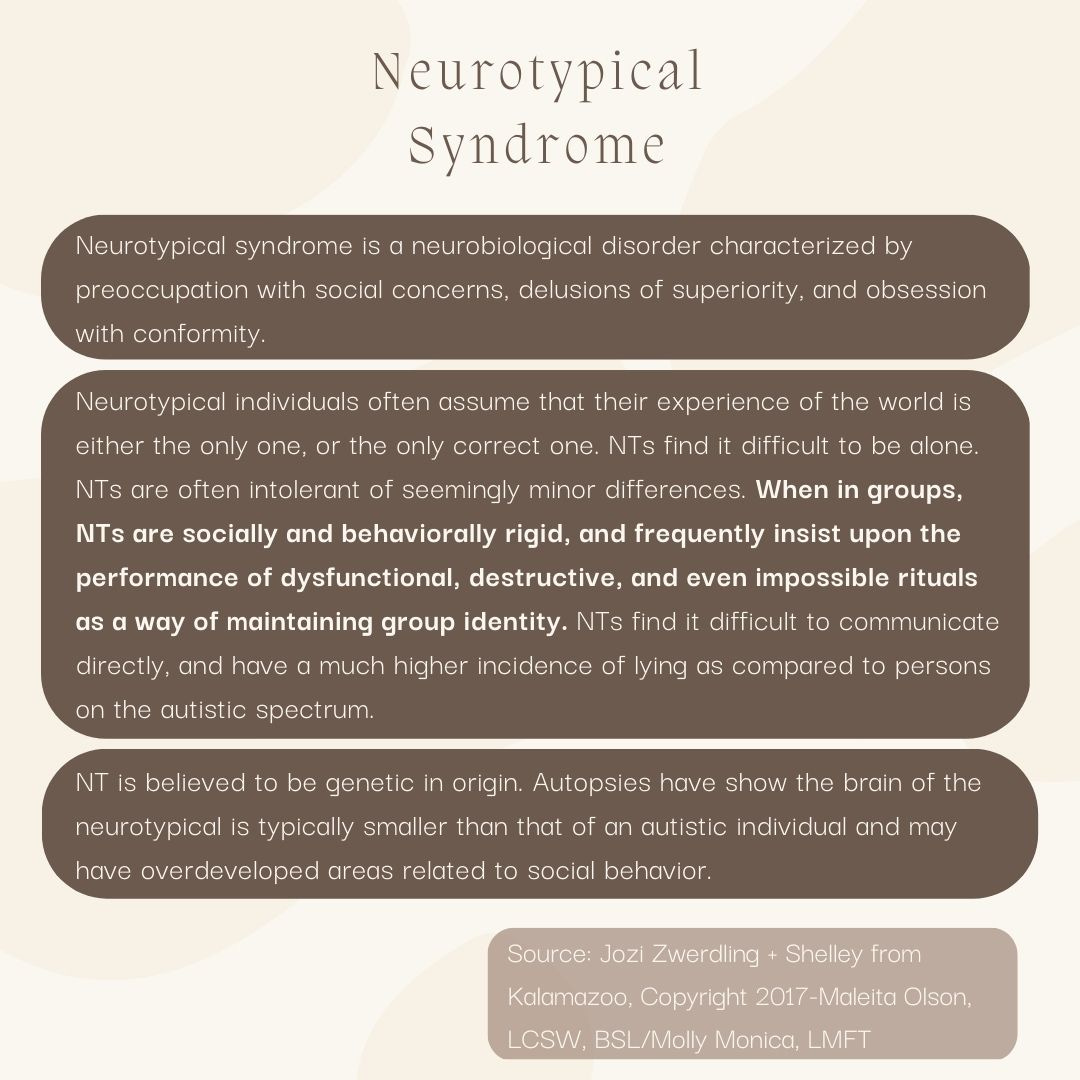Neurotypical Syndrome
questioning "normal" + imagining a new world
A few weeks ago, my close friend Jozi shared a projected slide from a presentation she was taking on Mindfulness Based Play Family Therapy and Autism Spectrum Disorder (ASD). I reorganized the information in the infographic above so that it’s easier to read. Both the slide and the graphic above describe the cause, classifications, and symptoms of “Neurotypical Syndrome,” a satirical disorder that someone with ASD created to highlight the absurdity with which the autistic neurotype is described and othered as the atypical experience in our society. They centered ASD as if it were the “normal” experienced neurotype and othered the experience of the neurotypical individual as if it were a “disorder” in our society.
When I first received the slide from Jozi, I began to cry— flowing through feelings of knowing and connection, feelings of being seen, of feeling found, of sensing community with who/what I was reading. I was wearing my noise cancelling headphones, waiting in a chaotic and crowded customs line after taking a 15 hour flight to South Africa, my body inflamed and aching from having to sit in one confined place for so long. Even if I’m enjoying dinner with a friend at a restaurant, I need to have my legs up, crossed in front of me on the seat— so taking a long flight without being able to twist and turn my body in the ways that support my vestibular and proprioceptive senses1 feels particularly draining for me, and I often need days of recovery and many body rubs to work through the swelling and cramping. Reading the slide was a necessary perspective shift and reminder that my needs are of value, too. They aren’t any less relevant than those of what neurotypical people experience, it’s just that our world has been set up to cater to NT needs and not mine.
My whole life, I’ve experienced aggression and open disdain from NT people who don’t understand my autistic experience— people who have verbally (and once, physically) attacked me in response to thinking I’m being cold or “a bitch” because I didn’t respond to them in the particular way they desired for me to in social situations; medical professionals who have minimized my symptoms and the discomfort I was feeling, not providing the correct diagnosis or even the correct dosage of medication because I wasn’t expressing my pain externally and vocally enough for them to validate it; coaches and employers telling me that I have potential but “not enough drive” because I’m not performing enough “sportsmanship” or “teamwork” or “acting like I care.”
And this is not just my experience, of course. As a society, we constantly stifle people who aren’t conforming to our ideas of “acceptable” and “correct.” We force neurodivergent children with creative energy pulsing through their bodies to sit still, to constrict the physical container that could actually help them express and move through what’s happening in their minds. We stifle ourselves— judging and shaming ourselves for having needs and desires beyond what society deems respectable. And more often than not, it’s those that have been stifled most frequently in their lives acting as the ones now most actively policing others.
I watch allistics (non-autistic people) get frustrated when autistic people have meltdowns, often calling us childish and self-centered. The truth is, I often experience neurotypical people as childish and self-centered— often intolerant of minor differences in others because of their obsession with conformity. I experience NT’s frustration when the first instance of something doesn’t go their way, whereas autistic people typically have meltdowns after the load of consistently trying to stretch ourselves to fit into a neurotypical world finally feels like too much to bear. And even after my diagnosis, I’ve had people ask me if I’m actually autistic because I don’t appear to “struggle” in the ways they believe autistic people should perform struggling based on their perceived stereotypes of ASD. Sometimes it feels that my entire life is lived in response or reaction to the NT experience, with NTs often judging my experience as “wrong” just because it doesn’t line up with their normal. There are many days that I view my autism as a gift, and still many days, primarily because of the way the NT world feels to me and responds towards me, it feels lonely and isolating. And on most days, both extremes exist complicatedly in my mind and body, intermingling together.
Keep reading with a 7-day free trial
Subscribe to field notes / love notes to keep reading this post and get 7 days of free access to the full post archives.


